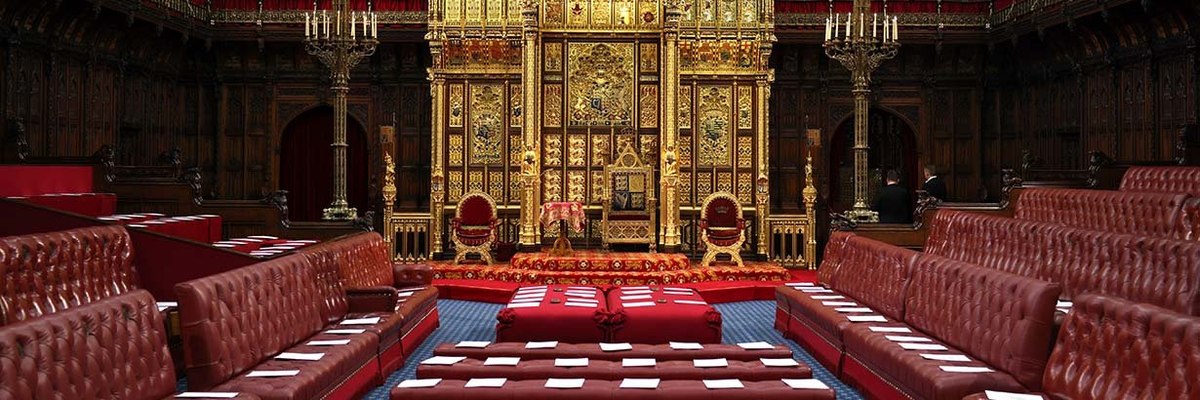Only one in seven Britons have a positive view towards the House of Lords, with 55% in favour of an elected upper house
For over a century, reformists have had their eyes set on the House of Lords, Britain’s ‘upper’ legislative chamber that counts bishops, aristocrats who inherit their position, and people appointed largely on the wishes of the prime minister as members. Reformers argue that its make-up is outdated and democratically indefensible, while defenders say that the Lords works well in spite of its unusual composition.
Because of the strength of opinion on both sides within Westminster, previous reforms have often been piecemeal, focussing on restricting the Lords’ powers or making minor adjustments to its composition, such as the last Labour government’s capping of the number of hereditary peers at 92. The latest reform of the chamber, announced by the new government, is set to remove those last remaining hereditary peers altogether.
But what do the British public think of the Lords as it is now, and do they favour even more radical reform options?
How do Britons want the House of Lords to be reformed?
Only one in six Britons (16%) support the House of Lords’ current set-up – i.e. largely appointed, partly hereditary peers and partly bishops – while six in ten Britons (61%) stand opposed to the Lords as it is today. This ratio is near-identical to the 16% who think hereditary peers should and 62% who think they shouldn’t continue to have places in the Lords, suggesting that it is their presence that the public most object to.
A majority of Britons (52%) are also opposed to automatic places for some senior Church of England bishops, with only one in five (22%) feeling that their presence should be allowed to continue.
As to potential alternatives, the only one that commands majority support from the public is an entirely elected upper house, which 55% of Britons support and only one in five (22%) oppose. A compromise position, whereby the chamber was partially elected and partially appointed, as per the abandoned reforms of the Conservative – Lib Dem coalition, is more divisive, supported by four in ten Britons (39%) and opposed by around a third (35%).
A chamber that just maintained the appointed element of the current House of Lords, without hereditary peers or bishops, holds support from 22% of the public, more than the status quo, but is still opposed by half of Britons (50%). It’s also a less popular alternative than outright abolition, whereby the House of Commons would become the sole house of parliament, which three in ten Britons (30%) would be in favour of, albeit with four in ten (42%) unsupportive of the idea.
An entirely elected House of Lords is by a clear margin the most popular option among Labour voters (68% support), Lib Dems (65%) and Reform UK voters (54%). Conservatives are instead most supportive of a part-elected, part-appointed body, which half of Tory voters (50%) are in favour of, but they still marginally prefer an entirely elected chamber (41%) to the status quo (35%).
Support for an entirely appointed chamber, which is what the Lords will largely resemble if Labour’s reforms pass, finds little enthusiasm among any voter group, with only between 22% and 26% of voters from all four main parties in favour of such a legislative chamber.
How do Britons see the House of Lords?
Only one in seven Britons (14%) have a positive view of the House of Lords, while four in ten (42%) see it in a negative light. This marks virtually no change from 2018, when YouGov found one in six Britons (17%) had a positive view of the House of Lords, against four in ten (38%) holding a negative view. For one in three Britons (33%), though, the Lords doesn’t spark either positive or negative emotions.
There is some division between parties, but even among Conservative voters - the group most favourable towards the House of Lords - only a quarter (25%) have a positive view of the chamber, against three in ten (31%) looking at it negatively. While positivity among Labour voters stands at just one in seven (15%), it’s overall not a left-right divide, with Reform UK voters the least happy with the upper house (9% having a positive view).
When it comes to whether the House of Lords plays a useful role in British politics, opinion also tends towards negativity. For the three in ten Britons (29%) who think the Lords does have purpose, half (49%) feel its function is not useful.
Again, we see the greatest scepticism towards the chamber among Reform UK voters, two-thirds of whom (64%) feel the Lords doesn’t play a useful role in British politics, compared to around half (45-50%) among those who’ve backed Labour and the Lib Dems, the parties that have traditionally favoured Lords reform.
Nonetheless, these doubts around the House of Lords do come with the caveat that few Britons feel they really understand what it is that the Lords does. Only 4% of Britons claim they have a lot of knowledge about how the Lords operates and what its role is, with this only widening to one in three Britons (32%) when including those who say they have a ‘fair amount’ of understanding about our upper house.
Two-thirds of Britons (64%) instead say they have not very much or no knowledge at all of how the House of Lords works.
What’s your view of the House of Lords, parliament in general, and everything else? Have your say, join the YouGov panel, and get paid to share your thoughts. Sign up here.
Photo: Getty






